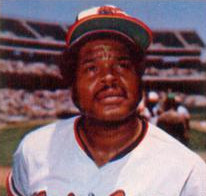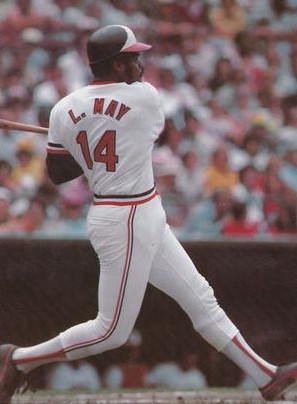Lee May facts for kids
Quick facts for kids Lee May |
|||
|---|---|---|---|
 |
|||
| First baseman | |||
| Born: March 23, 1943 Birmingham, Alabama |
|||
| Died: July 29, 2017 (aged 74) Cincinnati, Ohio |
|||
|
|||
| debut | |||
| September 1, 1965, for the Cincinnati Reds | |||
| Last appearance | |||
| September 24, 1982, for the Kansas City Royals | |||
| MLB statistics | |||
| Batting average | .267 | ||
| Hits | 2,031 | ||
| Home runs | 354 | ||
| Runs batted in | 1,244 | ||
| Teams | |||
|
|||
| Career highlights and awards | |||
|
|||
Lee Andrew May (March 23, 1943 – July 29, 2017) was a famous American professional baseball player and coach. He played in Major League Baseball (MLB) as a first baseman and designated hitter. His career spanned from 1965 to 1982. He played for the Cincinnati Reds, Houston Astros, Baltimore Orioles, and Kansas City Royals.
People called him "The Big Bopper" because he hit the ball with great power. May hit at least 20 home runs and had 80 runs batted in (RBI) for 11 years in a row. He is one of only 11 players in MLB history to get 100 RBIs for three different teams. He was chosen for the All-Star team three times. In 1976, he led the American League (AL) in RBIs. May played in the postseason three times, including the 1970 World Series with the Reds and the 1979 World Series with the Orioles.
After he stopped playing, May became a hitting coach for several major league teams. These included the Royals, Reds, Orioles, and Tampa Bay Rays. He was honored in the Baltimore Orioles Hall of Fame in 1998. In 2006, he joined the Cincinnati Reds Hall of Fame. He was also inducted into the Alabama Sports Hall of Fame in 2009. Lee May's older brother, Carlos May, also played professional baseball.
Contents
Early Life and High School Baseball
Lee May grew up in Birmingham, Alabama. He was a talented athlete at A.H. Parker High School. He was great at both baseball and football. May played fullback on the football team. He even received a scholarship offer from the University of Nebraska. However, the Cincinnati Reds baseball team was also very interested in him. On June 1, 1961, the Reds signed May to a contract. He received a $12,000 bonus.
Journey Through the Minor Leagues
May started his professional baseball journey in 1961. He played for the Tampa Tarpons. This team was part of the Reds' minor league system. After two years in Tampa, he moved up to the Rocky Mount Leafs. The next year, he was promoted again to the Macon Peaches.
May continued to play well and moved up the ranks. In 1965, he joined the San Diego Padres. This was a Class AAA team. He had an amazing season there. He hit 34 home runs and had 103 RBIs. He also had a batting average of .321. Because of his great performance, the Reds called him up to the major leagues briefly. In 1966, he played for the Buffalo Bisons. After another strong season, he was ready for the major leagues for good.
Major League Career Highlights
Cincinnati Reds: The Big Red Machine Years (1965–1971)
Lee May made his first major league appearance on September 1, 1965. He was a pinch hitter for the Cincinnati Reds. On September 24, 1966, he hit his first major league home run. It was a game-winning hit against the New York Mets. In 1967, May became a full-time player for the Reds. He was named the NL Rookie of the Year by The Sporting News.
May became a key player for the Reds. He joined stars like Johnny Bench, Tony Pérez, and Pete Rose. Together, they formed what was known as "The Big Red Machine." This team had one of the best offenses in baseball history. In 1968, May hit 22 home runs and had 80 RBIs.
In 1969, May had an outstanding season. He hit 38 home runs, which was third in the National League. He also had 110 RBIs, ranking fourth in the league. He even hit multiple home runs in three games in a row. This is a very rare achievement in baseball. His teammate Tommy Helms gave him the nickname "The Big Bopper from Birmingham."
In 1970, the Reds were incredibly strong. May had 94 RBIs that season. On June 24, 1970, he hit the very last home run at Crosley Field. This was the Reds' home stadium for many years. It was a game-winning shot in the final game played there.
May was a top performer for the Reds in the 1970 World Series. He batted .389 with two home runs and eight RBIs. His eight RBIs set a new record for a five-game World Series. He hit a three-run homer in Game 4. This helped the Reds avoid being swept by the Orioles. Even though the Reds struggled in 1971, May still hit 39 home runs and had 98 RBIs. He was named the Reds' Most Valuable Player for that season.
Houston Astros: A New Challenge (1972–1974)
In 1971, the Reds traded Lee May to the Houston Astros. This trade brought future Hall of Famer Joe Morgan to the Reds. The Astros needed more power in their lineup. May was known for his strong hitting.
Even though the Astrodome was a tough park for hitting home runs, May continued to drive in runs. In 1973, he had 105 RBIs, which was second in the league. That year, May also set an Astros club record with a 21-game hitting streak. During this streak, he hit three home runs in one game. He also got his 1000th career hit. On April 29, 1974, May made history again. He became the 17th player in MLB to hit two home runs in a single inning.
Baltimore Orioles: American League Success (1975–1980)
In December 1974, Lee May was traded to the Baltimore Orioles. He quickly showed his power in the American League. In his very first at-bat, he hit a three-run home run. When he played at Fenway Park in Boston, he hit two three-run home runs over the famous Green Monster. One of these was a game-winning hit.
His best season with the Orioles was in 1976. He hit 25 home runs and led the American League with 109 RBIs. For this great performance, he won the Louis M. Hatter Most Valuable Oriole Award. In his last three seasons with the Orioles, May mostly played as a designated hitter. This allowed a young Eddie Murray to play first base. May contributed to the Orioles' success in 1979. However, in the 1979 World Series, he only batted twice. This was because the designated hitter rule was not used in that series.
Kansas City Royals: Final Playing Years (1981–1982)
After leaving the Orioles, May signed with the Kansas City Royals. He played part-time as a first baseman, designated hitter, and pinch hitter. In 1982, he batted .308 in 48 games. At 39 years old, May decided to retire from playing baseball.
After his playing career ended, the Royals hired him as their hitting coach. He was part of the team that won the 1985 World Series. He earned a World Series ring as a coach.
Career Achievements and Legacy
Over his 18-season career, Lee May played in 2,071 games. He had a batting average of .267. He hit 354 home runs and had 1,244 runs batted in. He also collected 2,031 hits. May was known for striking out often, but he was also a powerful hitter. He is one of only 11 major league players to have 100 or more RBIs for three different teams.
Lee May has been honored in three different Halls of Fame. He was inducted into the Baltimore Orioles Hall of Fame in 1998. In 2006, he joined the Cincinnati Reds Hall of Fame. He was also inducted into the Alabama Sports Hall of Fame in 2009. Lee May and Frank Robinson are the only players to be in both the Orioles and Reds Halls of Fame.
Family Life
Lee May and his wife, Terrye, had three children and nine grandchildren. His son, Lee May Jr., was a first-round draft pick for the New York Mets in 1986. He played in their Minor League system until 1993. After that, Lee May Jr. became a baseball coach. He worked for the Mets, Cleveland Indians, and Seattle Mariners organizations. He also coached for the Boston Red Sox. Lee May Jr.'s son, Jacob May, also played baseball. He was drafted by the Chicago White Sox in 2013.
Passing Away
Lee May passed away on July 29, 2017, in Cincinnati, Ohio. He was 74 years old. He died from pneumonia and also had heart disease.
See also
- List of Major League Baseball career hits leaders
- List of Major League Baseball career home run leaders
- List of Major League Baseball career runs batted in leaders
- List of Major League Baseball annual runs batted in leaders
 | Audre Lorde |
 | John Berry Meachum |
 | Ferdinand Lee Barnett |


